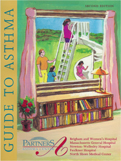Guide to Asthma
Lesson #5: Treating your asthma with medicines: The preventers
We have all come to accept the importance of prevention of tooth decay, and we apply toothpaste to our teeth once or twice daily. So too, treatments taken once or twice each day are generally effective in preventing asthma symptoms and severe, potentially dangerous asthma attacks. And we would all agree that breathing freely is at least as important as preventing cavities.
Medicines can act to prevent asthma in two ways. First, and most effectively, they can reduce the swelling and inflammation of the bronchial tubes, making the airways less sensitive to the triggers of asthma. Second, they can work throughout the day to stimulate the bronchial muscles to relax, helping to prevent the muscle spasms that narrow the bronchial tubes.
The best treatment to reduce the excessive sensitivity of the bronchial tubes is inhaled corticosteroids. These "steroids" are anti-inflammatory (not muscle building). They are safe because in the usual doses only miniscule amounts enter the bloodstream. Regular use of inhaled steroids in asthma has been proven to: improve your sense of well being, reduce symptoms of asthma, increase your breathing capacity, and decrease the risk of asthma attacks.
Other preventative anti-inflammatory medications are cromolyn and nedocromil. These are not in the steroid family of medicines. They are widely used among children, but among adults they are generally less beneficial than the inhaled steroids.
Medications that relax the bronchial muscles and help to prevent their contraction are called bronchodilators. Long-acting bronchodilators taken once or twice daily can help to control asthma, especially when used in combination with anti-inflammatory medications. Examples of long-acting bronchodilators are inhaled salmeterol (Serevent®), slow-release theophylline preparations (such as Theodur®, Uniphyl®, Slo-Bid®, and Slophylline®), and slow-release tablets containing albuterol (for example, Proventil Repetabs® and Volmax®). We favor salmeterol because it is powerful, lasts at least twelve hours, and has few side effects.
A new family of preventative medications has recently become available, called leukotriene [lou'-ko-try'-een] blockers. These medicines block a group of chemicals made by the body, the leukotrienes. Leukotrienes are important in both asthmatic inflammation and bronchial muscle contraction. Leukotriene blockers are available as tablets, can be taken once or twice daily, and generally have no side effects. For some persons they work very well, and in mild asthma they may be the only preventative medication needed.
Some persons with asthma need to take their preventative medicine only during allergy season or following a respiratory infection. However, for most people who have persistent asthma — with more than only very occasional symptoms — preventative medicines are an every day thing. Two good reasons to take your "preventer(s)" every day: you will feel better, and you will live safer from asthma attacks.

